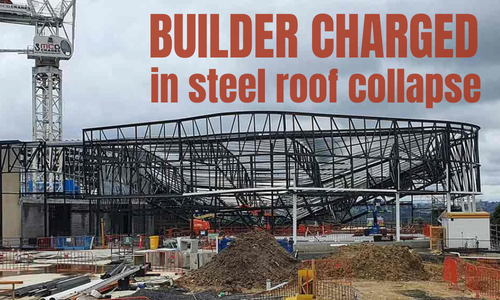News and Updates
Builder charged in steel roof collapse
04-Jun-2025
In October 2022, a building group and its façade subcontractor were working on the construction of Kew Recreation Centre in Melbourne. During the evening, a significant section of the steel-trussed roof structure collapsed. The collapse could well have had fatal implications, but luckily occurred outside working hours. It did cause major delays to the project, which only resumed in late 2024, with considerable costs in clearing and replacing the collapsed steel, and has had significant impact for many involved.
WorkSafe Victoria and the Victorian Building Authority (VBA) spent two years investigating the incident and the VBA ended up filing 18 charges against the builder and its director. The prosecution of those charges is ongoing.
The VBA stated that “The VBA alleges [the building group] knowingly carried out building work outside of what was allowed under their building permit. This includes that the company fabricated and erected a steel roof truss containing four spliced sections, instead of a single length of steel as required under the permit. The VBA also alleges that the welding of the structural steel framework was non-compliant, and the steel used in the truss did not meet Australian standards.
“If found guilty [the builder’s] director could face imprisonment and a fine of up to $108,000 on each charge. The company also faces fines of up to $540,000 for each offence.”
The VBA is continuing to investigate other practitioners associated with the build as well as other projects by the builder. This raises questions for other awarded contracts on similar projects.
The public were also detrimentally affected as the project’s completion will be significantly delayed.
Learnings from the collapse
Fingers have been pointed at the Chinese steel imported for use in the project and the conduct of the builder and its director including the verification of the quality assurance documents used in the project.
This shows the importance of every actor through the supply chain ensuring compliance. Unfortunately, this incident is not unique. It demonstrates at least three major errors that might be replicated in the market:
- The steel procured is not as specified in the design
- The steel procured does not meet AS/NZ Standards
- The processing/fabrication of the steel (e.g. welding or bending) does not meet AS/NZ Standards
Australian design standards require that structural steels are manufactured fully to the relevant AS/NZS standards and not to “equivalent” steel grades. Test results for steel cannot be ‘cherry picked’, but need to meet the requirements as outlined in the relevant standard to determine compliance.
Having certainty over your steel
ACRS’ mission is a safe built environment by making the process of ensuring steel compliance easy and efficient. The way it achieves this is through a robust independent certification process of the steel manufacturing and supply.
ACRS certifies both domestic and international steel manufacturers for their compliance to the AS/NZS standards. If a manufacturer is found not to be meeting the standard requirements, it is not granted a certificate. As a certificate holder, manufacturers/processors are assessed annually – if they are found to be non-compliant during assessments, then their certification is suspended. Certificate holders are under continues surveillance through the regular review of ongoing test, as required by the standards.
ACRS certificate holders are assessed on their process and procedures. This provides confidence that the manufacturer is consistently producing product that is compliant to the standard. During the assessments the ACRS assessors observe the management and production processes as well as selecting samples for testing. They will facilitate independent spot testing of material obtained onsite, through which confidence in the manufacturer’s own testing is generated. The standards recognise that random spot sampling is not always indicative of product quality, consequently they require ongoing batch testing.
Understanding processes and steelmaking is critical in determining quality, so the ACRS assessors are all industry experts and typically have over 40 years’ experience in the steel industry. The ACRS assessors have a depth of knowledge of that particular standard, and are selected in part for each assessment based upon their Technical and Operational experience for the type of steel/process.
All ACRS certification decisions arising from initial and annual follow up assessments are reviewed by an Independent ACRS Audit and Assessment committee which contains Academics, Structural and Design Engineers and representatives of End User bodies – a wealth of experience providing additional oversight to the certification process.
The ACRS Scheme also ensures traceability of product from dispatch from the mill back through the production chain and to the issued test certificates. This is crucial to ensuring compliance, as you can only be certain of steel if you are certain of its journey from production to arrival.
By selecting ACRS-certified steel suppliers, you can have confidence that steel you receive has been manufactured to the relevant AS/NZS steel standard. You can find ACRS-certified mills and suppliers in our public database.